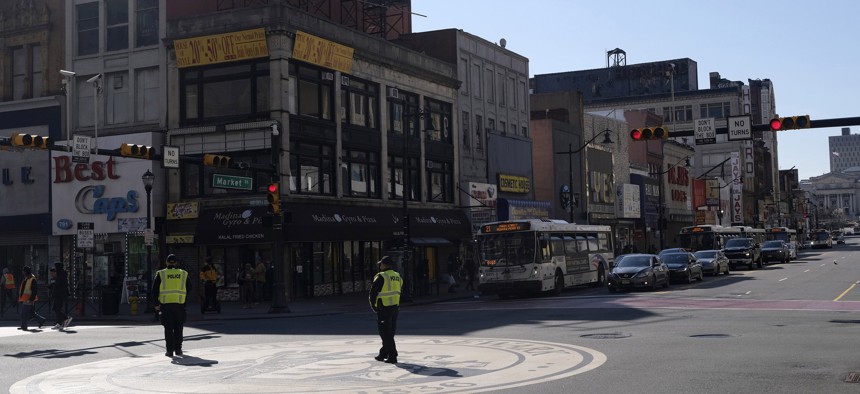A New Jersey City Mandates Business Inspections Before Reopening

Newark police officers, encouraging people to practice social distancing, patrol an intersection in Newark, N.J., Thursday, March 26, 2020. AP Photo/Seth Wenig

Connecting state and local government leaders
Newark created a color-coded permitting system that indicates a business’ level of risk based on its health and safety plan.
Cities across the country have sought to help businesses reopen following coronavirus closures by offering guidance or voluntary assessments of their health and safety plans.
But in Newark, New Jersey, the city’s 3,000 businesses must undergo mandatory assessments and inspections before they are allowed to reopen to the public.
New Jersey has recorded more than 170,000 Covid-19 infections, and officials in the state’s largest city are taking extra precautions when it comes to restarting the economy.
To receive a permit to reopen, businesses must complete a six-page questionnaire that asks about safety protocols such as measures taken to ensure social distancing, use of personal protective equipment and testing of employees. Based on a cumulative assessment of the answers, each business is assigned a color-coded permit that is to be displayed inside the establishment and code enforcement officers conduct an in-person inspection, said Jerrah Crowder, the manager who oversees the permitting process in the city’s Economic and Housing Development Department.
“We know there are inherent risk levels for different types of establishments,” Crowder said. “We take a look at how each individual business mitigates that risk.”
Non-essential businesses are required to be certified before reopening while essential businesses that remained open during the pandemic are asked voluntarily to complete the process, Crowder said.
Green certificates indicate the protocols in place put the business in the lowest risk category, while yellow and red certificates indicate higher levels of risk. Of the 1,000 businesses that have applied for reopening permits so far, 167 businesses received green certificates, 409 received yellow, and 240 received red, Crowder said. Department staff offer assistance to businesses in improving their plans if they are not up to par and no one has been denied a reopening permit.
However, if a company reopens without one the city will order it to shut down.
Newark Mayor Ras Baraka recently encouraged residents to report businesses operating without a color-coded permit, defending the program as an educational tool for citizens.
“We should spend our money only at businesses that care about protecting our lives and that are not just about making money," Baraka said. "The purpose of our guidelines is to inform, protect, and make sure the necessary precautions are being taken during these challenging times so that people can make the right decisions for themselves and their families.”
Elsewhere in the United States, cities and states have adopted less stringent measures.
In Connecticut, businesses are asked to self-certify their compliance with health and safety guidelines through an online questionnaire.
Other jurisdictions have rolled out voluntary inspection programs to help businesses improve their health and safety practices. Palm Beach Gardens, Florida created a voluntary certification program through which businesses can request an in-person inspection to review whether they meet the state’s reopening guidelines. Businesses that meet the guidelines are issued a signed and dated certificate.
“The thought is that residents will be more inclined to visit these businesses if it has been voluntarily inspected, verified, and issued a certificate of verification,” reads a statement on the city’s website.
In central Missouri, Pulaski County and the cities of St. Robert and Waynesville partnered with the local chamber of commerce to create a voluntary assessment for businesses, according to the Rolla Daily News. The survey asks business owners to report what measures they’ve taken to protect the health of employees, prevent crowds from gathering, increase sanitation and ensure social distancing. After completing the survey, each business receives a certificate to display in the establishment.
“No regulatory action such as an inspection will be taken,” said Deborah Baker, the director of the Pulaski County Health Center and Home Health Agency. “It’s an honor system and will remain as such. Everyone posts the same sign to display in their business.”
In Newark, the mandatory inspections are carried out by a team of city workers across several departments. More staff were added to the team as needed to keep up with the workload, but Crowder said it’s been manageable so far.
After businesses submit online permit applications, the team is able to review them and make a determination within 72 hours. An inspection, which takes about 15 minutes, is scheduled within 24 hours after a permitting decision is made. The process can take longer, however, if business owners submit handwritten applications, Crowder said.
“We have many businesses with many types of needs and I think we’ve been able to accommodate those businesses quite well,” he said.
Andrea Noble is a staff correspondent with Route Fifty.

NEXT STORY: One State is Manufacturing Free Masks for Any Resident Who Wants One




